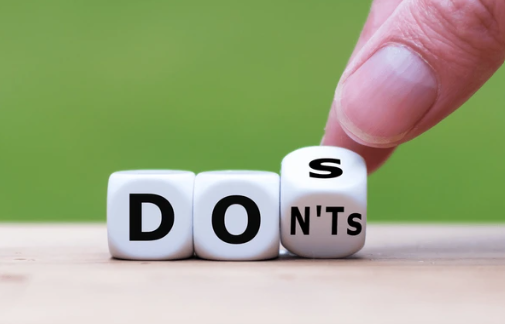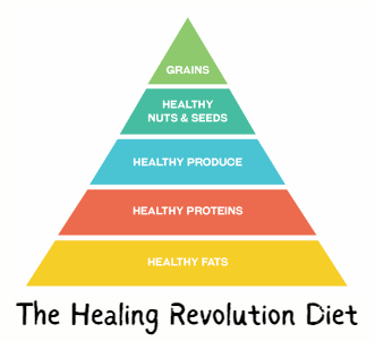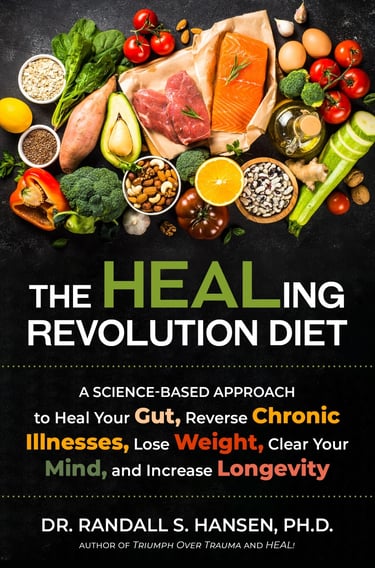Healing Revolution Diet Do’s and Don’ts
It’s not you, it’s the foods (and a few other key issues) that are making us fatter and sicker, whether you are aware of it or not. What we eat affects every function in our bodies – and brains – and our ability to lead a long and optimal life.
Cancer, heart attacks, strokes, dementia – none of these things have to be in our future; it’s not about genetics (well, a tiny bit), but mostly about how we treat our bodies and what we expose them to that determines our health – and healthspan.
These key nuggets of food, health, and nutrition information are excerpted from The Healing Revolution Diet, a newly published book described as “a solution for optimal health for everyone.”
Key Food, Nutrition, and Health Do’s and Don’ts
Do start making food a priority and as an investment in your health and healing. Food is the top factor affecting our health and longevity, yet many have food as a “low-budget” item. Change that.
Don’t follow any more fad diets; these are only temporary aids to weight loss, not for supporting health. For more information, read my article, Diets Don’t Work… and Other Truths About Food.
Do build or join a supportive community, which is vital for all aspects of health and healing. A healing and health journey can be turbulent at times, and the support of your loved ones is essential to your success. Read my article, Why Relationships are KEY to a Healing Journey.
Don’t eat at fast food restaurants, which make mostly ultra-processed foods from the cheapest ingredients. One example: McDonald’s fries have 19 ingredients, including added sugar.
Do start cooking more from scratch, which is the best tool for creating the healthiest foods. These meals do not need to be elaborate or time-consuming; many meals can be made from scratch in under 30 minutes and others can be slow-cooked all day in a crockpot. Consider creating a wellness kitchen; see my article: Tips for Creating a Wellness Kitchen.
Don’t buy most conventionally-raised meats, vegetables, and fruits, because these products are inundated with chemicals, from pesticides to hormones and antibiotics. With the animals, they are often fed an unnatural diet to fatten up while being stressed from tight quarters in feedlots. Read my article, Hold the BEEF! For Your Health, Eat Only Sustainable, Pastured Beef.
Do consume more healthy fiber, which has been found lacking in more than 90 percent of all diets because ultra-processed foods remove the fiber. Fiber is such an important nutrient, especially for our gut microbiome. Read my article, For Good Health, Please Consume (More) Fiber!
Don’t count calories. It’s a waste of time, even though every single food label, by law, has to list the calories. There is a big difference between calories in the food (listed on the label) and the actual usable calories – the concept of caloric availability.
Do find for yourself the best balance of animal- and plant-based foods for optimal health – and only obtain those foods from quality sources.
Don’t fall into the cholesterol trap, another misguided theory. So much disinformation still being published, but the key is dietary cholesterol is not a concern for most people.
Do embrace healthy fats of all kinds, including plant-based and animal fats; we are deficient in fat because of so many “low-fat” ultra-processed foods. Healthy saturated fats do not cause plaque or heart disease, as was thought incorrectly for decades.
Don’t consume any simple carbohydrates, eliminating all sugars and white flours. Simple carbs have no real use for most people, converting quickly into sugar in your body. If you choose to eat carbs, focus on more complex carbs, which take longer to digest.
Do decide for yourself whether gluten and dairy are good or bad for your health. The debate over these two items is still being hotly debated. If you can eat foods with gluten and lactose and experience no side effects (such as bloating and stomach pain), then do so, but make sure you are buying organic.
Don’t drink sodas, juices, and other sugary beverages, which some have labeled “diabetes water,” and are major drivers of the obesity and chronic health crisis.
Do stay hydrated, including drinking a glass of water about 30 minutes before every meal. Drink lots of water; you can add natural flavors or even bubbles to make more appealing. Consider using a safe (no-sugar) electrolyte brand to up the value of your hydration. Remember too that people often eat when the body is actually dehydrated – not hungry. The standard recommendation that you should modify based on your circumstances: males should consume 15.5 cups of water daily; females about 11.5 cups daily. Read my article, How Thirst Often Confuses People Into Eating More.
Don’t snack all day long; it’s a dieting urban legend; snacking all day spikes blood sugar, possibly leading to insulin resistance. In fact, most nutrition experts suggest eliminating most daily snacking as well as shortening the time window of when we eat, from the typical 12 hours to something like 8 hours (or even shorter, especially when using intermittent fasting).
Do add more vegetables to your meals; they add both nutrients and fiber to your diet, but remember to find the vegetables that your body most needs and that do not produce side effects (such as from lectins and oxalates). For more information, read my article, What You Need to Know About Plant Antinutrients.
Don’t eat dessert for every meal, which is currently happening because so much of the food available to us in grocery stores and restaurants have high amounts of added sugars.
Do start reading ingredient labels and changing buying habits, which should be a key step in your health journey; awareness of the many sugars and chemical additives will change your buying habits. For more information, read my article, Keys to Truly Understanding Food Labels.
Don’t simply replace sugar with questionable sugar substitutes, especially those in the convenient yellow, pink, and blue packets. Try stevia or allulose, or simply try eliminating all sweeteners.
Do cook big batches of foods for second, third meals – as a convenient way during the work week to have some simple meals that just need reheating for a healthy dinner.
Don’t use any “vegetable” seed oils, which are produced in a toxic chemical process using both bleach and solvents and contain high levels of Omega-6 fats and linoleic acid, which are considered inflammatory.
Do use healthy oils and fats in place of those “vegetable” seed oils. Healthy oils and fats include grassfed butter, olive oil, avocado oil, coconut oil, and ghee.
Don’t eat ultra-processed foods, which are the bulk of the items in your typical grocery store – including almost all the food items on the shelves and in the frozen section. These are the foods that are the leading cause of our health and obesity crisis. Read my article, Are Ultra-Processed Foods Killing You?
Do shop at farmers markets and food co-ops, which usually not only have the freshest and healthiest foods, but by doing so, you also support the local farmers in your community.
Don’t consume refined sugars. Stop all (or as much as possible) sugar use, which has been a known toxin and additive substance for more than 60 years. Fructose (from sugar) is a poison in our bodies. Read my article, The Deadly Truth About Our Sugar Addiction.
Do eat more nuts and seeds, which contain many beneficial nutrients as well as being a wonderful and healthy source of fiber.
Don’t fall for food marketing gimmicks, such as “all-natural” or “heart-healthy” or “important source of vitamins and minerals.” These statements have no meaning or value but are meant to trick you.
Do eat more mushrooms, avocados, and eggs; these three are true superfoods, packed with so many nutrients and beneficial elements for our bodies and brains.
Don’t eat too much fruit, which have a place in most diets because of the nutrient value, but have a high (natural) sugar content that makes them to be eaten in moderation for most.
Do buy organic whenever possible. Yes, you will pay more for the products, but you will be avoiding so many chemical contaminants and genetically-modified elements found in conventional foods.
Don’t ignore the advice of adding more fermented foods into your diet; eating some fermented foods aids and strengthens your gut microbiome.
Do consider growing some of your own food, whether that’s a big garden in your yard or a window box in your apartment – or a plot in a community garden. Eating freshly picked foods is truly magical – providing you with the highest levels of nutrients. Read my article, Why We Need a New Victory Garden Movement.
Don’t always eat breakfast; consider intermittent fasting, which gives our digestive system a longer and restorative rest between eating. Skipping breakfast occasionally is the easiest way to do a short fast. See my article, Are You Utilizing the Power of Intermittent Fasting?
Do understand that our food system is horribly broken, focused on producing low-nutrient and highly-addictive foods produced from the cheapest conventionally-grown ingredients. Most of the hundreds of food brands are owned by a handful of conglomerates focused purely on profits and shareholder wealth.
Don’t forget to clean up the nonfood areas of your household, including removing as many chemical products as possible, starting with air fresheners, carpet cleaners, antibacterial soaps, and more. Read my article, Are the Chemicals in Your Home Killing You?
Do develop a diet based on how your body, brain, and gut react to foods – which is the basic premise of the Healing Revolution Diet. Everyone needs to develop a customized diet based on how their bodies react to certain foods.
Don’t stop seeking health and healing knowledge because we are continuing to make breakthroughs and gain new understanding of how we can all live our best and healthiest lives.
Do consider getting bloodwork done to test for vitamin and mineral deficiencies, as well as the basic metabolic panel (BMP) and lipid panel, which examine blood glucose, cholesterol, and triglyceride markers.
Don’t allow yourself to become overwhelmed when making changes to your diet. Take one step at a time in your health journey, starting with one change and slowly making others. Remember, it is a journey and not a race.
Do heal your past trauma wounds, which may be driving some of your food addiction and other struggles. If we can both fix our food debacle AND heal from our past trauma, then the sky is the limit in terms of a long and productive and happy, love-filled, and peaceful life! See my article, Discover the Methods for True, Wholeistic Healing.






